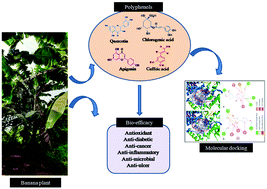A pharmacological perspective of banana: implications relating to therapeutic benefits and molecular docking
Abstract
Banana is one of the most nutritious fruits, as it is rich in carbohydrates, proteins, fatty acids, and minerals. Banana has been used in traditional medicines for managing coughs and colds, ulcers, burns, and diarrhea. Banana contains various bioactive compounds, such as alkaloids, phenols, flavonoids, tannins, and saponins, with reported therapeutic benefits, including antioxidant, anti-diabetic, anti-cancer, anti-inflammatory, and anti-microbial activities. The present review focuses on a comprehensive overview of the nutritional and biological properties and phytochemicals of different species of banana and its different parts. Although detailed characterization of the compounds that are present in many parts of the plant has been carried out, chemical profiling of the seed, pseudostem, and leaves of banana is lacking and requires further exploration. Moreover, the functions of the reported compounds were elucidated using computational tools, supporting their potential role in managing life-threatening diseases and physiological complications.



 Please wait while we load your content...
Please wait while we load your content...